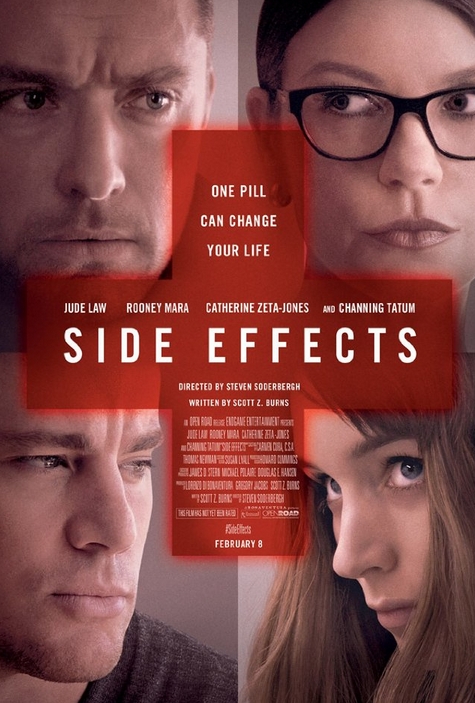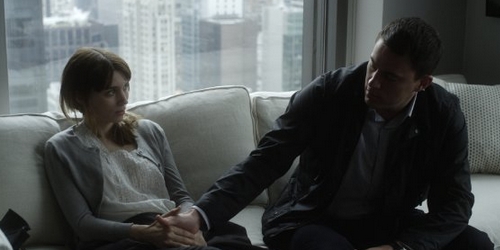 Medication and depression these days go hand-in-hand. However, it wasn’t always this way. If you were unhappy, you often put on a brave face and dealt with it. If you were over a certain age, you couldn’t sit and pout. Nowadays, medication has taken away the fear, anxiety, and depression from everyday life for a lot of people. Are we better off with being in a medically-induced euphoria? At one point a character in Stephen Soderbergh’s latest—and possible last—film, Side Effects, tells their patient that these drugs simply allow us to be our real selves. That’s a tricky idea to grapple with. What is our true selves? The one aided by a pill to be more social and outgoing? Or is the one that sometimes cowers in a corner a piece of your own individually flawed makeup and what ultimately makes you, you? There’s no truly easy answer here.
Medication and depression these days go hand-in-hand. However, it wasn’t always this way. If you were unhappy, you often put on a brave face and dealt with it. If you were over a certain age, you couldn’t sit and pout. Nowadays, medication has taken away the fear, anxiety, and depression from everyday life for a lot of people. Are we better off with being in a medically-induced euphoria? At one point a character in Stephen Soderbergh’s latest—and possible last—film, Side Effects, tells their patient that these drugs simply allow us to be our real selves. That’s a tricky idea to grapple with. What is our true selves? The one aided by a pill to be more social and outgoing? Or is the one that sometimes cowers in a corner a piece of your own individually flawed makeup and what ultimately makes you, you? There’s no truly easy answer here.
What is given instead is an exploration of what makes us unique and how the pharmaceutical company, the doctors, and our selves have pushed this notion that medicine can be our savior and give us the lives
we preciously want to lead. That trio is a potentially potent and powerful ménage à trois. We focus on the life of Emily, played by the innocent and troubled Rooney Mara, and we can see how she is having trouble coping. We don’t know what it is, but it may stem from her husband Martin’s (Channing Tatum) return from prison for insider trading. Whatever it is, we are shown the ways the people around her are also putting themselves in a medically-induced happiness. At least two times by two different women she is consoled and then recommended a different medicine that the women have had their own success with. In fact, at a certain point it appears that nearly every woman that we, as an audience, interact with is on something. Fear not, though. The men here get their share of medical attention as well. This isn’t a simple female thing. There are some genuinely troubled people out there, and Emily seems to be just one more of the millions.

After a particularly bad episode, she goes to see a psychiatrist named Dr. Banks (Jude Law), who starts to prescribe various pills. None of them seem to work. As one often overhears or has experienced, the typical side effects are there: very little emotion; no sex drive; a hazy and unfocused mental state. Instead of making people happy, it turns them into zombies. Then comes Ablixa, a new drug that is making waves in the market and it’s just what Emily needs. At one point her husband says, “whoever makes this drug is going to be fucking rich.” Indeed, everything seems to finally be going Emily’s way. But the side effects… oh, they’ve not so great. Suddenly the film’s entire mood and atmosphere changes. Whereas this was once a film about rich people being sad sacks on the inside, it turns into an uncovering of the emotions, methods, and financial benefits that surround the pharmaceutical companies. Would you agree to be part of a test if your drugs were free and given to you by your trusted psychiatrist?

This two hour thriller is as shape-shifting as Soderbergh has been throughout his career. No, it’s not enough to make you think. Not enough to make you fear what we do to ourselves. He wants to also entertain and get our heart racing. By the final shift, Side Effects becomes all of those in one. When he lays all his cards on the table, it’s a race to the finish, and I was thoroughly enthralled throughout. A large part of this stems from Soderbergh’s frequent collaborator, writer Scott Z. Burns. Burns has wanted to give the audience a true thriller in the vein of some of Alfred Hitchcock’s greats. That’s a lofty goal, but making a thoroughly convincing thriller with some scientific background is right up Burn’s alley. The acting here is also superb, led by Mara and Law, who also bring in Catherine Zeta-Jones to provide a twisted and interesting addition.
G-S-T- RULING:
However, it would be reprehensible to not give praise to Soderbergh’s additions as well. The mood and atmosphere made by his editing and cinematography make this something you could watch without audio. Witness the haze around a flashback sequence and how everything seems so white and crisp, until the cops show up in their black SUVs. He focuses us on what is necessary, and blurs the backgrounds often. He meticulously picks angles to show what he wants us to see at that time. Overall, this is one of his best-shot films in quite a while, and we can see his flair is just as bright as it ever was. You think you know exactly what the film is, but it has its own mind. The result isn’t bulletproof. This isn’t Soderbergh’s crowning achievement. Yet, whether this is his last film or not, Side Effects can stand on its own merit.

